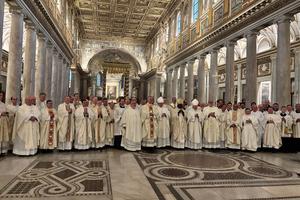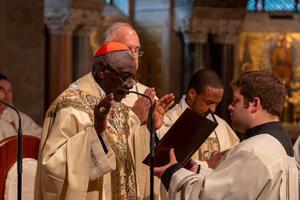Arnaud Beltrame, Cardinal Sarah and Learning to Die in Lagrasse
COMMENTARY: As we embark on the Holy Triduum, the examples of an unknown religious brother and a French law enforcement officer have much to teach us.

A fortnight ago, I had the blessing of hosting Cardinal Robert Sarah at our chaplaincy in Kingston, Ontario, and our parish on Wolfe Island.
By word and example, he encouraged us to find the “profound silence [where] we can enter these mysteries and see with the eyes of our body and soul the cross of salvation present on the altar.”
A week later, the news arrived of terrorist violence in France. And I thought of Cardinal Sarah and the power of silence in the face of gunfire. The two are connected in a way most fitting for Holy Week.
A jihadist terror attack in France is not the news it used to be. It now happens a few times a year, and the president of France says what the president customarily says for such occasions.
So the terror attack in the supermarket in Trèbes the Friday before Palm Sunday was set to proceed in the routine manner. Until the news about Lt. Col. Arnaud Beltrame of the French Gendarmerie Nationale became known. And then it became another story altogether.
Beltrame, on duty at the scene, offered to take the place of a woman being held hostage by the jihadi. It was an act of both Christian courage and tactical brilliance. The jihadi agreed to the swap, and so Beltrame was able to draw close, leaving his mobile phone on so that the police outside could hear what was going on. When the police stormed the supermarket, Beltrame was stabbed and shot by the jihadi and died of his wounds the next day.
Beltrame was civilly married and preparing for a Catholic wedding in June. His widow saw great significance that he died on the eve of Holy Week, for she said her husband’s sacrifice could not be understood apart from his Catholic faith.
The French diocese for the armed forces announced his death with the words: “There is no greater love than to give one’s life for one’s brothers.”
In the hours after Beltrame’s death became known, he was compared to St. Maximilian Kolbe, the Franciscan friar who was killed by the Nazis after volunteering to take the place of another prisoner in the death block of Auschwitz.
Much more will have to be known about Beltrame’s life before such a comparison can validly be made, but there are connections to the death of a religious brother, one introduced to the world by Cardinal Sarah — Brother Vincent-Marie of the Resurrection. Brother Vincent and Arnaud Beltrame have much to teach us about dying.
For the last year and a half, Beltrame had been preparing for marriage and going regularly for Mass and formation at the Abbey of Lagrasse, home to a young religious order that moved into and restored the formerly abandoned monastery. As Beltrame lay unconscious and dying, it was a priest of this abbey who administered the sacrament of the sick and granted him the apostolic pardon.
The Catholic world learned of this detail from the social-media pages of Cardinal Sarah and the co-author of his interview books, French writer Nicolas Diat. Cardinal Sarah had made several visits to the Abbey of Lagrasse since October 2014, when he met and befriended Brother Vincent, a young canon paralyzed and made mute by multiple sclerosis.
Brother Vincent deeply touched Cardinal Sarah — Sarah’s autobiographical God or Nothing is dedicated to him, and he is named as the inspiration for the cardinal’s second work, The Power of Silence.
That book’s introduction describes their bedside meetings as “a fragment of eternity,” a tender friendship of prayer carried out entirely in silence. Brother Vincent died April 10, 2016. Cardinal Sarah went to France to offer his funeral Mass.
Not long after Brother Vincent’s death, Beltrame began visiting Lagrasse to prepare for his own vocation. There were plenty of contrasts between the lives of Beltrame and Brother Vincent. Beltrame was preparing for a sacramental marriage, while Brother Vincent vowed a life of celibacy. Beltrame was second-in-command of the region’s police, a decorated veteran of the French special forces; Brother Vincent was an electrician who had lost the use of his hands. Beltrame was a man of action; Brother Vincent was paralyzed.
Beltrame’s death followed a decisive heroic sacrifice made in the heat of a violent conflict; Brother Vincent’s was a slow surrender as the ravages of multiple sclerosis erased his ability to work, to walk, to read, to speak and to breathe. Beltrame was honored by the French president as a national hero; Brother Vincent died unknown to the world except for the introduction of Cardinal Sarah’s book.
After being Cardinal Sarah’s interlocutor for two books, Diat released a book of his own this year, entitled Un temps pour mourir (A Time to Die).
Diat takes his readers on a pilgrimage through eight monasteries in France, hoping to rediscover the art of dying well. His first stop? The Abbey of Lagrasse.
Diat recounts how the young community at Lagrasse was profoundly shaped by Brother Vincent — the first of their new community to die — through the reality of his declining capacities and the daily care for his needs.
Dying is the supreme act of a monk’s life; one might say that his entire life is a preparation for dying. Brother Vincent knew he was dying for years, and the other canons through him had an extended encounter with death.
Brother Vincent was silent for the last two years of his life. This silence, though, was a time of profound encounter, not only with God, but with the other monks — and even a visiting cardinal.
Cardinal Sarah would speak of this silence as a source of charity and welcome. This school of charity would be extended to other visitors to the abbey, including Lt. Col. Beltrame and his wife, as they were prepared — with considerable rigor — for their sacramental marriage.
And most unexpectedly, that school of charity touched a woman taken hostage in a terror attack in a supermarket in Trèbes, when Beltrame put his life in peril to save hers.
There is a haunting moment in Un temps pour mourir when Diat describes his surprise one morning in walking through the grounds of Lagrasse to see a freshly dug grave. It had already been prepared for Brother Vincent while he was still alive.
On the morning of March 23, there was no grave prepared for Lt. Col. Beltrame. There was no need. He was strong and vital and preparing for his future. The earth was not ready for his death, but Beltrame’s heart — perhaps even unknown to him — was ready to die. It had been made so in part by the spiritual patrimony of Brother Vincent in the Abbey of Lagrasse.
The day after Beltrame’s death, the triumphal entry of Jesus into Jerusalem was celebrated in that abbey. On that first Palm Sunday, no one thought there might be a need to make ready a grave for Jesus. And there was no tomb ready for him that Friday; Joseph of Arimathea had to lend him his.
The death of Arnaud Beltrame made headlines, a moment of high drama. Yet we may well think that it had been prepared by the spiritual fruit of the silent death of Brother Vincent.
Greater love has no man than this, that a man lay down his life for his friends (John 15:13).
It is possible for a man to lay down his life, too, for a stranger. And it is also possible for a man, already confined to his bed, slowly dying, to make friends in that silence.
Father Raymond J. de Souza is editor in chief of Convivium magazine.














